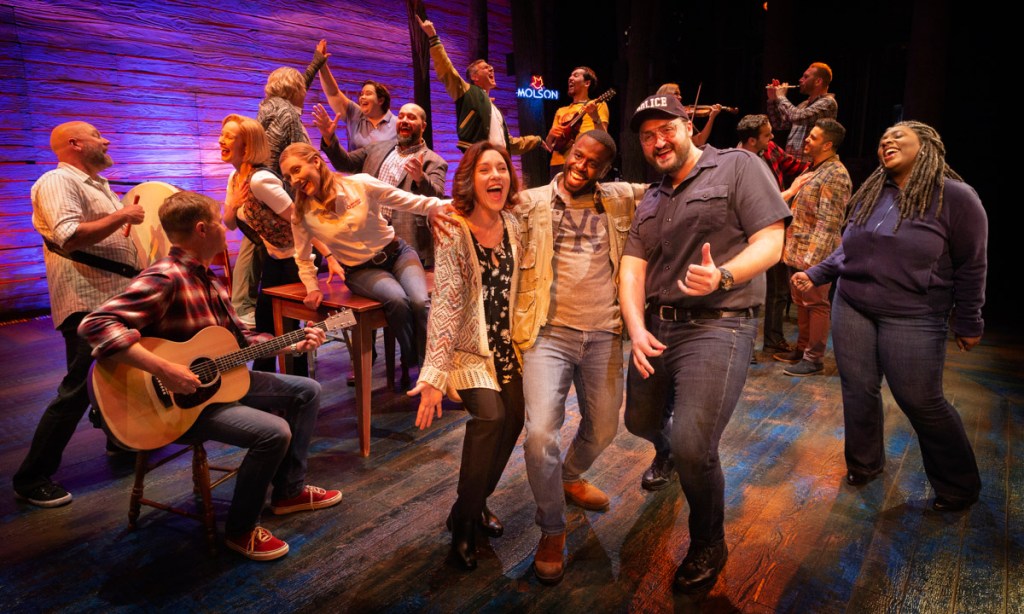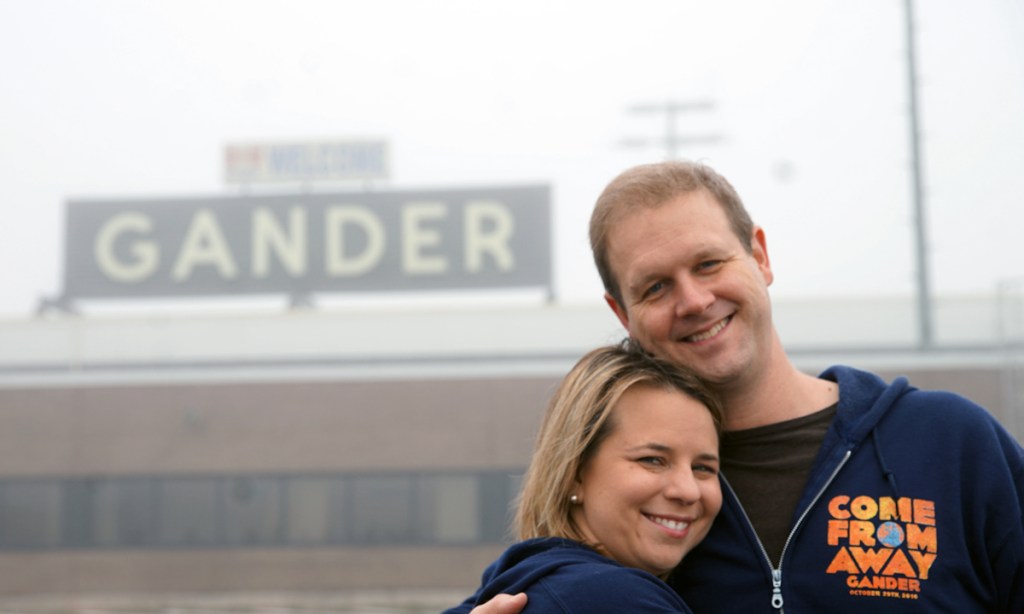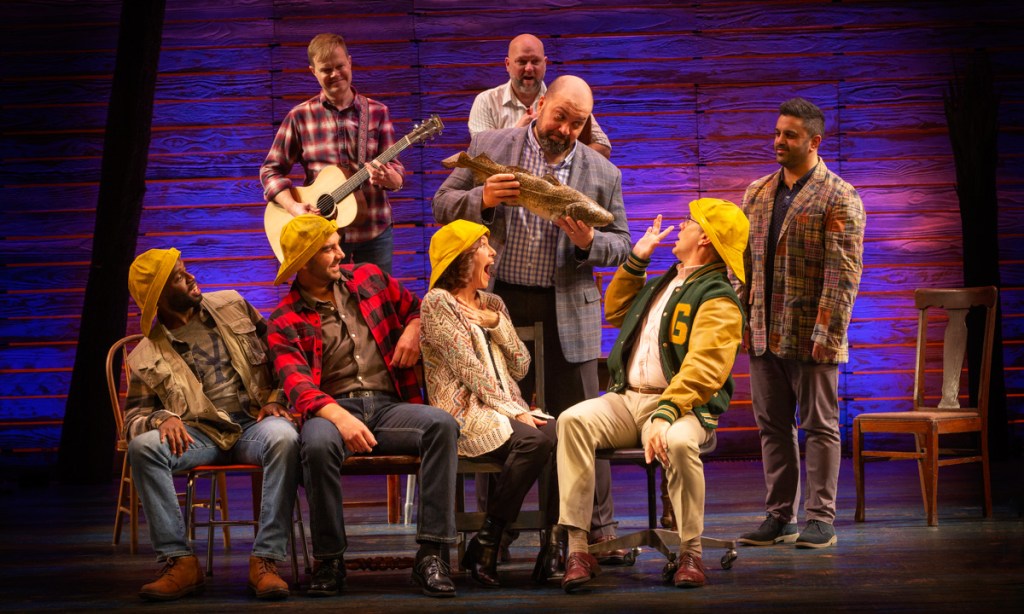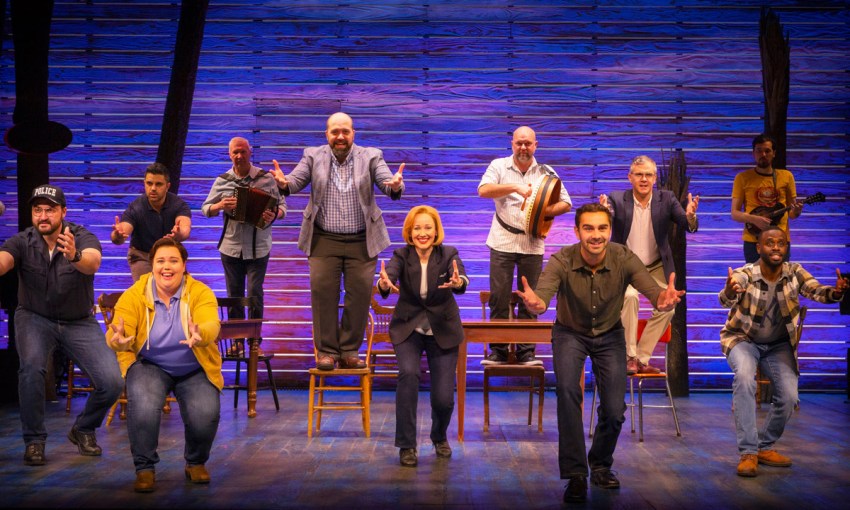September 11 is remembered as day of terror and destruction, but Broadway musical 'Come From Away' tells the true story of an island in the Atlantic where thousands of people on diverted flights were welcomed amid the uncertainty.
‘Come From Away’ and the enduring appeal of kindness
Everybody above a certain age can recall the moment they learned about New York’s September 11 attacks, such is the power of that day.
Come From Away
28 March—29 April
Her Majesty’s Theatre
58 Grote Street, Adelaide 5000
Tickets
For me, it was a school day, a few days before my 13th birthday, and I woke up earlier than usual. Mum was in the lounge room, glued to the TV as a morning show looped footage of aeroplanes flying into the Twin Towers – again and again and again.
I don’t remember getting to school that day, but I remember the fear. As I walked through the gates of Millicent North Primary School, deep in the state’s South East, I wondered if we would ever be the target of an attack.
As far as 9/11 stories go, it’s not particularly interesting, but halfway across the world, in another small town called Gander, in the Canadian province of Newfoundland, an entirely more eventful story took place.
After the US Government shut down the nation’s airspace, 38 aeroplanes were diverted to Gander from New York. The regional town has a rich aviation history, so it had the capacity to take these diverted flights, but the planes carried 7000 people, which meant Gander’s population of 9000 almost doubled in an instant.
—David Hein
When the planes landed, Gander’s entire township was called on to respond, offering accommodation, hospitality, supplies and comfort as the passengers learned together, in a time before mobile phone ubiquity, why their planes had been diverted.
It’s a story of kindness in a time of crisis, and is so exceptional it caught the attention of theatremakers Irene Sankoff and David Hein, who turned it into the hit Broadway musical, Come From Away, which opens in Adelaide this week.
Irene and David first heard the story in the lead up to a 10-year anniversary the Newfoundlanders and come-from-aways (the Newfoundland term for out-of-towners) were planning. The husband-and-wife team decided to come along and collect stories for their theatre work.

Although the story begins on 11 September 2001, Irene and David were sure about one thing: “We didn’t want to write a 9/11 musical, we wanted to write a 9/12 musical – about the response to a tragedy,” David says. “These people… had shown kindness and trust and opened their hearts and their homes to people in the shadow of this horrible day.”
The duo was less in agreement, though, about what form the story should take.
“[Irene] thought it shouldn’t be a musical, and I thought it should,” David laughs.
“I had grown up on Newfoundland music and knew how unique and wonderful and powerful it was.
“It’s this incredible, rich, folk-rock music that originated from Ireland, so it has Celtic roots in it – it has fiddles and accordions, hand drums called a bodhrán – but also unique instruments to Newfoundland, like an ugly stick.”
As part of the anniversary celebrations, David and Irene attended a benefit featuring musical performances, and “the minute the music started playing, everyone jumped up,” David recalls.
“It wasn’t just the locals, it was the come-from-aways, it was the executives in their three-piece suits, and they were swinging each other around,” he says.
“You immediately got this sense that music is who Newfoundlanders are – it’s in their DNA.
“It’s how they’ve gotten through their long winters, by coming together and playing music. It’s how they respond to crises, it’s how they get through dark times.
“Irene turned to me and said, ‘Yeah, ok, it’s a musical’.”
Just as important as the music was the portrayal of Newfoundlanders – that stereotypical Canadian politeness ratcheted up by its combination with regional-town camaraderie.
“When we first left there, our only goal was to get it right for them, and if they ever saw the show, we would want them to come up to us afterwards and tell us, ‘You told our story right’,” David says.

Irene and David in Gander. This picture: Supplied
Claude Elliott was the mayor of Gander in 2001, and part of the response team who took care of the 7000 surprise arrivals.
He met David and Irene at the 10-year anniversary, and although he didn’t know much about musicals (“I had no idea what a musical was. I had not seen a musical”), he was sceptical of the fuss.
“We just went out and helped the people that was here that needed help, and when they went away, our job was done. We were never going to see anybody or hear from anybody again,” Claude says.
“When the writers talked about, at the 10th anniversary, the idea of doing a musical… I was trying to visualise in my own mind, ‘How are you going to make a musical out of blankets and pillows and sandwiches and soup and toilet paper?’”
David and Irene distilled the hundreds of perspectives they gathered into just a handful of stories, then developed the show in workshops with students.
By the time the show saw its first audiences, it was 12 years on from September 11. Still, David and Irene were concerned about whether it was the right time to tell a happy story about that day.
“Once we actually got in front of an audience, and especially American audiences, yeah, we were quite nervous about it. But I think we wrote it with that concern,” David says.
“We invited members from the 9/11 community, who were directly affected, and what they told us was that this story was a tribute to those that were lost. It reminded them that there were people helping on that day and that there was goodness left in the world.”
As the show progressed to larger audiences, they were given a strong indication they’d achieved something special.
“We have always received a standing ovation, every single night, and I think that’s a testament to the story that we’re telling,” David says. “I think people are giving a standing ovation for the generosity of the Newfoundlanders, for the kindness.”
—David Hein
Not only is Claude a character in the show, but he often tours with the production and will address the crowd afterward to speak to the truth of the story. He’s no longer sceptical of its narrative value.
“It took me a while to come around to see, but I guess they knew what they were doing,” he says. “When it was put together, I said, ‘Wow, if I wasn’t part of this, I would want to see this, because this is a good news story’.
“I’m so proud to be part of it. I tell people that bad news stories keep getting told; I’ll never get tired of telling a good news story, and if I can help somebody feel a little bit better, I’ll be more than glad to do it.”
Claude’s pride in the musical is the way it’s intrinsic to his home town.
“The spirit is not only Gander but the whole province of Newfoundland and Labrador,” he says.
“We’re an island out in the Atlantic, and it’s harsh at times, and I go back to my grandfather’s day, where survival was meant by helping each other. And that was passed down from generation to generation.
“If you have a slice of bread and your neighbour don’t, you give your neighbour half and you keep half.”
Gander’s size is also an important narrative factor.
“If you landed in New York City, with eight or nine million people… there would be enough hotels to put you in, you wouldn’t have to go into people’s homes,” he says.
“In Gander at that time, 9300 people, I probably knew 7000 people by name… I’m not sure that living in a city of seven or eight million, that you’ll ever be that close.
“But you can teach [audiences] the way it should be, and hopefully it’ll happen in small quantities: no matter how big a community you are, you can be kind.”

I was invited to see Come From Away in November last year, at the Royal Theatre in Sydney. In the moments before the show began, I felt a mixture of emotion rising in my chest – the culmination of 20 years of life and culture permeated by the September 11 Attacks.
As the show started, the feeling spread from my chest throughout the rest of my body – hairs raised on my arm at the displays of care and compassion, my knees bobbed to the Newfoundlander music. By the end, I cried, as I was warned I would – though not for sadness.
“I think people cry for the good reasons,” David says. “People often talk about passing Kleenexes along the row, and there are some very sad moments in the story that we’re telling, but there’s far more funny ones and hilarious moments and life-affirming ones. I find people crying because of that.”
After my conversation with Claude, I thought again of that 12-year-old version of myself who wondered if his tiny town of 5000 people would see its own 9/11.
With Come From Away in my heart, I hoped that boy would have been as quick to kindness as the people of Gander.




